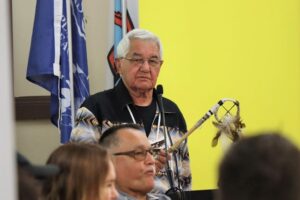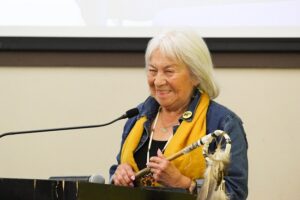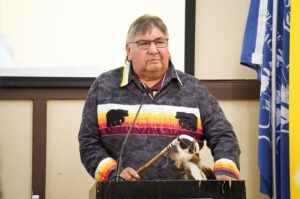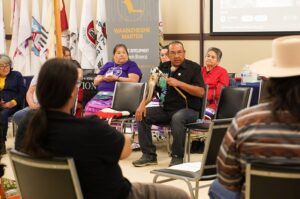Teachings and storytelling at annual Anishinaabe Giizhigad celebrations

By Rick Garrick and Marci Becking
CURVE LAKE FIRST NATION — The Anishinabek Nation celebrated Anishinaabe Giizhigad, the national holiday observed every year on June 6, with a celebration welcoming E’Dbendaagzijig and special guests in Curve Lake First Nation both in-person and virtually.
Host community Ogimaa Keith Knott provided the welcoming address following the opening drum song by Mshkaaziwin Drum Group and recitation of Ngo Dwe Waangizid Anishinaabe by Getzit Puckwiss Johnson.
“To me, it’s a joy to be amongst you all this morning! Enjoy, talk amongst each other — much is to be learned,” he expresses. “I’d like to acknowledge our Elder with her prayer here this morning, how beautiful our language is.”
Guest speakers include Anishinabek Nation E’Dbendaagzijig Commissioner Jeannette Corbiere Lavell and Commissioner on Governance Patrick Wedaseh Madahbee who both instilled Anishinaabe pride in all those taking in the day.

“We are Anishinaabe. We are a strong people. It’s not the English or French who are the founding people, it’s us, Anishinaabeg,” Corbiere Lavell says. “Celebrating today as Anishinaabe Day is a day to search out our history, potential, knowledge — all of the information that we have within our people — and start using it. Today is a good day to start.”
“We have a way of life that that has been around for thousands of years — history didn’t begin when those folks came over,” says Madahbee. “Let’s practice Anishinaabe Giizhigad every day!”
Elder Josh Eskawkogan (Ozaawa Nimkii) of Wiikwemkoong Unceded Territory walked attendees through the origin story of Ngo Dwe Waangizid Anishinaabe – the Preamble to the Anishinaabe Chi-Naaknigewin.
“It is really nice to share the history of this and a lot of it has to do with the Elders on Manitoulin and we did it with the guidance of our M’Shiikenh-baa. He was very important to our group. We received direction from Ogimaa Pat (Madahbee) — there were a lot of us in the Lodge and people from Zhiibaahaasing, Wasausking, Aundeck Omni Kaning, Wiikwemkoong, M’Chigeeng, and more.”
Elder Eskawkogan says that many who helped create the Ngo Dwe Waangizid Anishinaabe have since passed into the Spirit World.

“We all brought our Bundles, the Pipes. That was very important. We smoked the Pipes around the table. We wrote the Preamble four or five times to put everything into perspective of Anishinaabe people. We needed to understand who we are. What is our identity? Our language was part of who we are. We understood we were part of the land. We identified everything in our own language; lots of meetings at the Ojibwe Cultural Foundation of how to say it in the language. We looked at it as everyone and wanted to include everybody – Ngo Dwe Waangizid Anishinaabe [One Anishinaabe Family – everyone in the nation on the land]. We need to connect to the Anishinaabe way,” he recounts. “There [were] at least 20 Pipes in that council and there are probably only four or five of us left… One of the first things we said was Debenjiged —everything belongs to the Creator… It took us a long time to understand the four elements. We were given these gifts. The sacred fire – the coals are our ancestors; Aki – how we use the land; we use the air that we breathe in for balance; Nibi – how do we look after the water and support women to look after the water? Shkagmigaang is Mother Earth. We won’t be here anymore if we lose any of the four elements.”
“The Creator gave us the Seven Grandfather Teachings and we talked about how we look after them. Ogimaa said this morning that we are born with these teachings and it’s up to us to use them in a good way — there was a lot of discussion in regards to that. We were to provide this Preamble to our Leadership — this is how we look after ourselves as a Nation. We were really proud – we knew it was a legacy that they had created and it was for the future. They were really firm on what they believed; we have to get our kids to understand how they look after these elements. We will lose the teaching if we don’t pass it on. We have to make sure that we respect the past, respect the now, and respect the future. We are doing this for our children and our youth. This is how our beautiful Preamble came about for you to use.”
Maya Chacaby, Anishinaabemowin Scholar, citizen of Red Rock Indian Band, showcased a snippet of an online : post-apocalyptic role-playing adventure game for players to learn Anishinaabemowin called Biskaabiiyaang.
“We shouldn’t be in these classrooms just learning nouns to memorize, we need to be experiencing it. We need to learn about the relationships with the language. All of the four-legged cousins speak Anishinaabemowin. We need to have relationships with them. The idea of ceremony and dreams is so important. We need to make the language a story. In order to do that we had to tell a new story about a new itself,” says Chacaby.
At first, she created Biskaabiiyaang: where players can take on Linguicidals, and the warriors are obsessed with pronunciation, the Mage want to learn vocabulary, and there is a big boss battle, who is the teacher, at the end. As a result of this game, the level of proficiency skyrocketed following play. Now she is working on an online version with support from the Nokiiwin Tribal Council.
“That’s how powerful Anishinaabemowin is. This is a space that colonization can’t touch. When you start to learn the language, it can’t be touched by outsiders.”
Attendees received Anishinaabe Dodemaag and Chi-Naaknigewin Teachings led by Chop Waindubence during the in-person and virtual Anishinaabe Giizhigad celebrations where he emphasized the importance of the Grandfather Teachings.

“An absence of one of these teachings is an absence of all,” says Waindubence, a Sheguiandah citizen whose father was the late Anishinabek Nation Head Getzit Mishomis Gordon Waindubence M’Shiikenh-baa. “A part of this Residential School System was to kill the Indian in the child — what is the best way to do that? The very first Grandfather teaching that we have [Love]: that absence of love — [it] wasn’t there.”
Waindubence says the absence of love in the Indian Residential Schools was like the reverse side of the Eagle Feather he was holding.
“Everybody wants to know this feather right here, this side because it’s nice, it’s smooth, but we tend to forget the other teachings of that feather, where it’s rough, where it’s coarse,” Waindubence says. “What is the opposite of love? If this word is ever shared amongst the young [people] — a young individual like my son here — if they have ever felt like that, it’ll destroy them. And that is exactly what that government did to us, this word is so powerful it can destroy anybody no matter what age you really are. To feel love, that’s the difference… Zaagidwin (love), you can’t speak it, you have to feel it.”
Grand Council Chief Reg Niganobe stressed that there are many Anishinabek nations within Turtle Island, including Grand Council Treaty #3 in northwestern Ontario and Treaty 8 in Alberta, and welcomes them.
“Grand Council Treaty #3 is going to come and visit, Treaty 8 will be here with us for a little bit, I know we have some folks watching online from the States,” notes Grand Council Chief Niganobe.
He highlights that the Bay Mills Indian Community gifted him the medallion he is wearing during the celebrations during a trip to the United Nations to help them with issues related to water in their lands.
“We got to share stories with them and teachings with them that we both understood and we both knew and we both had in common,” Niganobe says. “Their Tribal President Whitney Gravelle gifted me this [medallion with] the woman carrying the water — our water protectors. In turn, I gifted her my medallion, which is the birch bark one, which are very beautiful [and] were done on this side.”
Treaty 8 Deputy Grand Chief Ramona Horseman, who is also Chief of Horse Lake, attended the celebration with other guests from Treaty 8 and shared a Creation Story that featured the four elements of earth, water, air, and fire, as well as a fifth element of love.
“This fifth one, I heard the word spoken quite a bit by [Chop Waindubence] who was telling us the stories,” Horseman says. “The Creator would wrap his arms around you with love and that was how [they] created you.”
The Anishinabek Nation celebrates Anishinaabe Giizhigad on June 6 to honour Anishinaabe identity, history, traditions, pride, and most importantly, people, and also commemorate the proclamation of the Anishinaabe Chi-Naaknigewin and the adoption of the Preamble, Ngo Dwe Waangizid Anishinaabe, on June 6, 2012. On November 17, 2021, the Anishinabek Nation Leadership Council proclaimed June 6 as Anishinaabe Giizhigad, a national holiday.
The Anishinabek Nation concluded the Anishinaabe Giizhigad celebrations with a community feast.
A recording of the livestream of the 2023 Anishinaabe Giizhigad celebration is available on the Anishinabek Nation YouTube channel.
There were also a number of Anishinabek Nation member First Nations from across the Anishinabek Nation territory that also implemented activities to celebrate Anishinaabe Giizhigad with their citizens near and far.

